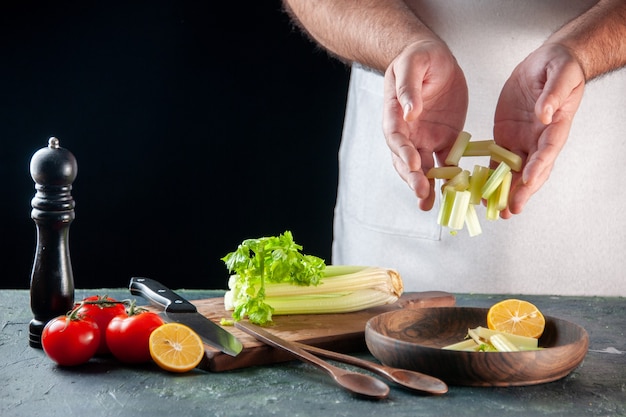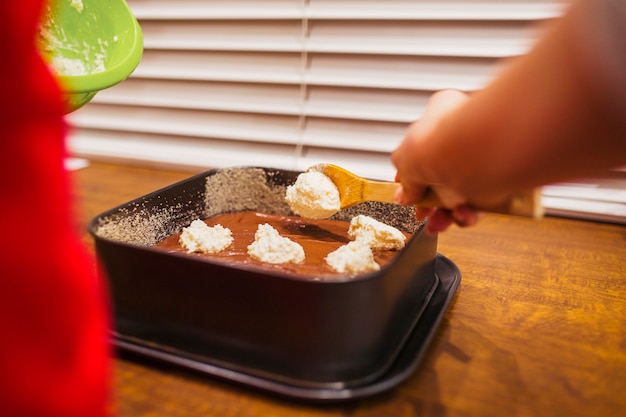You know the saying, "You are what you eat?" Well, I'd argue that a big part of that equation is the oil we use to cook our food. It's something we use every day, but often don't give much thought to. But choosing the right oil can make a huge difference in the taste and healthfulness of our meals. So, let's delve into the world of cooking oils and discover the best choices for our bodies and our kitchens.
(Part 1) Understanding Cooking Oils: Beyond the Basics

Think about how often you hear the word "oil" used in a recipe. "Drizzle with olive oil," "sauté in vegetable oil," "bake with butter" – we use oils for everything! But beyond the cooking aspect, we need to understand what makes each oil unique. It's all about the smoke point, the fatty acid profile, and the overall health impact.
1.1 The Smoke Point: Where Oil Starts to Break Down
Imagine you're frying something up and you suddenly see wisps of smoke rising from the pan. That's the oil reaching its smoke point. It's the temperature where the oil starts to break down and release harmful chemicals. Not only does this make your food taste off, but those chemicals are also not good for you.
So, when you're cooking, you want to use oils that have a high smoke point, especially for frying or high-heat cooking. This ensures that your food cooks evenly and doesn't end up tasting like burnt oil.
1.2 Fatty Acid Profiles: The Building Blocks of Oil
We've all heard the terms "saturated fat," "monounsaturated fat," and "polyunsaturated fat," but what do they actually mean? These are the different types of fatty acids that make up oils, and they have a big impact on our health.
- Saturated fats are typically solid at room temperature and are found in things like butter, coconut oil, and palm oil. While they provide energy, eating too much saturated fat can raise bad cholesterol levels, which increases the risk of heart disease.
- Monounsaturated fats are liquid at room temperature and are considered heart-healthy. They help lower bad cholesterol levels and may even improve blood pressure. Olive oil and avocado oil are excellent sources of monounsaturated fats.
- Polyunsaturated fats are also liquid at room temperature and include omega-3 and omega-6 fatty acids. Both are essential for health, but most Western diets have too much omega-6 and not enough omega-3. Oils like sunflower oil, flaxseed oil, and soybean oil are high in polyunsaturated fats.
The balance of these fatty acids in a particular oil determines its properties and its impact on your health. So, knowing the fatty acid profile of an oil is key to making smart choices.
(Part 2) The Good, the Bad, and the Olive Oil

Let's take a closer look at some of the most popular oils and their pros and cons.
2.1 Olive Oil: The Mediterranean Favourite
I'm a big fan of olive oil. It's versatile, flavorful, and healthy. I use it in salad dressings, for sauteing, even for drizzling over pasta. It's rich in monounsaturated fats, which can help lower bad cholesterol levels and improve heart health. Olive oil is also a good source of antioxidants, which help protect cells from damage.
But not all olive oil is created equal. Here's a quick rundown of the different types:
- extra virgin olive oil (EVOO) is the highest quality olive oil, made from the first pressing of olives. It has a fruity, peppery flavour and a low acidity level. It's the best option for flavour and health benefits.
- Virgin olive oil is also high quality but may have a slightly milder flavour than EVOO. It's still a healthy choice.
- Olive oil is refined olive oil that has a neutral taste and a longer shelf life. It's a good option for everyday cooking but may not have the same nutritional benefits as extra virgin olive oil.
Always choose extra virgin olive oil whenever possible, and store it in a cool, dark place to preserve its flavour and nutritional value.
2.2 Coconut Oil: The Tropical Trend
Coconut oil has been a hot topic for a while now. It's a great oil for frying and baking because of its high smoke point and unique flavour. It's also a good source of lauric acid, which has been linked to antibacterial and antiviral properties.
However, coconut oil is very high in saturated fat, so it's best to use it sparingly. While it can be part of a healthy diet, too much coconut oil can lead to an increase in bad cholesterol.
2.3 Avocado Oil: The Up-and-Coming Star
Avocado oil is a fantastic choice for those looking for a healthy oil for high-heat cooking. It has a high smoke point, a neutral flavour, and is rich in monounsaturated fats and vitamin E. It's a versatile oil that can be used for frying, baking, and even salad dressings.
The only downside to avocado oil is that it can be more expensive than other oils. But if you're looking for a healthy and flavorful oil, it's worth the investment.
(Part 3) Oils to Avoid or Use Sparingly

While we've discussed some healthy oil choices, there are some that we should be mindful of or limit in our diets.
3.1 Vegetable Oil: The Supermarket Staple
You'll find vegetable oil in most kitchens, and it's often the cheapest option. But the problem is that "vegetable oil" is usually a blend of different oils, often including soybean oil, corn oil, and canola oil. These oils are high in omega-6 fatty acids, which, while essential, need to be balanced with omega-3 fatty acids. Most of us eat too many omega-6 fatty acids and not enough omega-3s, which can lead to inflammation.
While vegetable oil is fine in moderation, it's best to choose other healthier oils more often.
3.2 Canola Oil: The "Healthy" Myth
Canola oil is often marketed as a healthy oil, but it's not as good as it's often made out to be. It's mostly made up of omega-6 fatty acids, and it's frequently genetically modified. There's also concern about the processing involved in making canola oil, which can lead to the formation of trans fats, which are harmful to our health.
While it's convenient and neutral in flavour, it's best to limit your intake of canola oil and opt for healthier alternatives.
(Part 4) Choosing the Right Oil for the Right Job
Now that we've discussed the most common oils, let's talk about choosing the right one for specific cooking methods.
4.1 Frying and High-Heat Cooking:
For frying and high-heat cooking, you need an oil with a high smoke point to avoid those nasty fumes and ensure your food cooks evenly. Here are some excellent choices:
- Avocado oil: Its high smoke point and neutral flavour make it ideal for frying.
- Coconut oil: While it has a unique flavour, it also has a high smoke point and works well for frying.
- Extra virgin olive oil: Although it has a lower smoke point than avocado or coconut oil, it can be used for frying at medium heat. Its flavour will add a nice touch to your dishes.
4.2 Baking and Roasting:
For baking and roasting, you can use a variety of oils, depending on the flavour you want to achieve.
- Olive oil: Adds a delicious Mediterranean flavour to baked goods.
- Coconut oil: Gives baked goods a rich, tropical flavour.
- Butter: Provides a classic buttery flavour and richness that other oils can't replicate. It's important to remember that butter is high in saturated fat, so use it in moderation.
4.3 Salad Dressings and Sauces:
For salad dressings and sauces, you want an oil with a flavour that complements the ingredients.
- Extra virgin olive oil: The classic choice for salad dressings and light sauces.
- Walnut oil: Its nutty flavour pairs well with salads and roasted vegetables.
- Sesame oil: Its toasted nutty flavour adds a unique touch to Asian-inspired dishes.
(Part 5) The Importance of Storage: Keeping Your Oils Fresh
You wouldn't leave milk out on the counter, right? The same principle applies to cooking oils. Exposure to light, heat, and air can cause them to break down, becoming rancid and losing their flavour and nutritional value. Here's how to keep your oils fresh and flavorful:
- Store oils in cool, dark places: Keep them away from direct sunlight and heat sources.
- Keep oils tightly sealed: This prevents oxidation and keeps air from interacting with the oil.
- Use oils within their recommended shelf life: Most oils have a shelf life of about six months to a year. Check the label for specific instructions.
(Part 6) The Bottom Line: Finding the Oil That’s Right for You
There is no single "best" oil. The ideal choice depends on your individual needs, cooking habits, and dietary preferences. Here are some things to consider:
- Your cooking habits: How often do you fry? What kinds of dishes do you cook most often?
- Your dietary needs: Are you trying to reduce your intake of saturated fats? Are you looking for oils rich in omega-3 fatty acids?
- Your budget: Some oils are more expensive than others. Experiment with different oils to find the best balance for you.
Don't be afraid to try new things! Experimenting with different oils is a great way to discover new flavours and find the ones that work best for you.
(Part 7) Beyond the Kitchen: The Benefits of Cooking Oils
We've been talking about cooking, but oils have many other uses. They can even benefit your skin and hair!
7.1 Skin Care:
Coconut oil is a popular choice for moisturizing skin and reducing dryness. It can be used as a body lotion or even as a makeup remover. Olive oil also has skin-soothing properties and is often used in soaps and lotions.
7.2 Hair Care:
Coconut oil is a great natural hair conditioner, helping to add shine and reduce frizz. Olive oil can also be used as a hair mask to nourish and strengthen hair.
(Part 8) FAQs: Your Cooking Oil Queries Answered
8.1 Is it okay to reuse cooking oil?
Generally, it's not a good idea to reuse cooking oil, especially for frying. Repeated heating breaks down the oil, releasing harmful chemicals. If you're on a tight budget, you can reuse oil for low-heat cooking, but it's best to replace it after two or three uses.
8.2 What's the difference between refined and unrefined oil?
Refined oils have been processed to remove impurities, resulting in a neutral flavour and a longer shelf life. Unrefined oils retain their natural flavour and aroma, but they may have a shorter shelf life. For everyday cooking, refined oils are generally fine. For flavour and health benefits, opt for unrefined oils, like extra virgin olive oil.
8.3 Are all oils vegan?
Most oils are vegan, but some may contain animal products. For example, butter is not vegan. Always check the ingredients label to ensure the oil is vegan if you're following a plant-based diet.
8.4 What's the best oil for deep frying?
Avocado oil and coconut oil are excellent choices for deep frying because they have high smoke points. They can withstand high temperatures without breaking down and releasing harmful chemicals.
8.5 Can I use olive oil for frying?
Yes, you can use olive oil for frying, but keep in mind that it has a lower smoke point than other oils like avocado or coconut oil. It's best to use extra virgin olive oil for frying at medium heat.
(Part 9) A Final Word
Choosing the right oil for cooking and your overall health can seem overwhelming, but it doesn't have to be. By understanding the different types of oils and their properties, you can make informed decisions that benefit both your health and your taste buds. So, explore the world of cooking oils, experiment with different options, and discover the ones that are perfect for you!
Everyone is watching

How to Cook Frozen Lobster Tails Perfectly: A Step-by-Step Guide
RecipesLobster. Just the word conjures up images of lavish meals, special occasions, and a taste of luxury. But let's...

Pork Fillet Cooking Time: How Long to Cook It Perfectly
RecipesPork fillet, or tenderloin as it's sometimes called, is a real favourite in our house. It's so versatile, and...

Pigs in a Blanket Cooking Time: How Long to Bake for Perfect Results
RecipesAh, pigs in a blanket. Just the name conjures up images of those delightful little parcels of crispy pastry en...

The Ultimate Guide to Cooking Delicious Frankfurters
RecipesLet's face it, we all love a good frankfurter. It's a classic, simple, and always satisfying. But let's be rea...

Wolf Meat Recipes: A Guide to Cooking Wild Game
RecipesLet's be honest, you don't see wolf meat at your local butcher shop every day. It's a bit of a wild card, but ...
